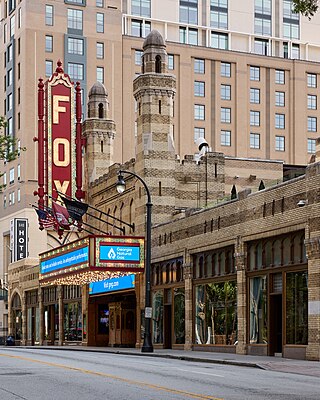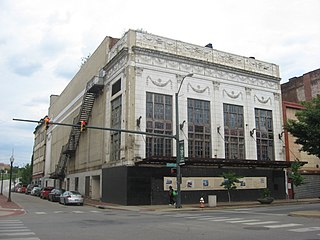
The Seattle Center is an entertainment, education, tourism and performing arts center located in the Lower Queen Anne neighborhood of Seattle, Washington, United States. Constructed for the 1962 World's Fair, the Seattle Center's landmark feature is the 605 ft (184 m) Space Needle, an official city landmark and globally recognized symbol of Seattle's skyline. Other notable attractions include the Pacific Science Center, Climate Pledge Arena, and the Museum of Pop Culture (MoPOP), as well as McCaw Hall, which hosts both the Seattle Opera and Pacific Northwest Ballet. The Seattle Center Monorail provides regular public transit service between the Seattle Center and Westlake Center in Downtown Seattle, and is itself considered a tourist attraction.
The year 1972 in architecture involved some significant architectural events and new buildings.

The Historic Lobo Theater is a movie theater, concert venue, and cocktail lounge located along historic Route 66, at 3013 Central Avenue NE in Albuquerque, New Mexico in the United States of America.

The Pruneyard Shopping Center is a 250,000 sq ft (23,000 m2) open-air shopping center located in Campbell, California, at the intersection of Campbell Avenue and Bascom Avenue, just east of State Route 17. It was built in the 1960s as the PruneYard Shopping Center. It includes shops, a DoubleTree by Hilton inn, a movie theater originally built in 1964, and three office towers built in 1970, one of which is the tallest building in the area outside of downtown San Jose.

The Fox Theatre, a former movie palace, is a performing arts venue located at 660 Peachtree Street NE in Midtown Atlanta, Georgia, and is the centerpiece of the Fox Theatre Historic District.
Landmark Theatres is a movie theatre chain founded in 1974 in the United States. It was formerly dedicated to exhibiting and marketing independent and foreign films. Landmark consists of 34 theatres with 176 screens in 24 markets. It is known for both its historic and newer, more modern theatres. Helmed by its President, Kevin Holloway, Landmark Theatres is part of Cohen Media Group.

The Woods Theatre was a movie palace at the corner of Randolph and Dearborn Streets in the Chicago Loop. It opened in 1918 and was a popular entertainment destination for decades. Originally a venue for live theater, it was later converted to show movies. It closed in 1989 and was demolished in 1990.
Richard Layton Crowther,, was an architect and author who achieved international renown for his progressive holistic compositions, particularly his pioneering designs employing passive solar energy.

The Liberty/Paramount Theatre was an early movie palace located on West Federal Street and Hazel Avenue in Youngstown, Ohio.

An atmospheric theatre is a type of movie palace design which was popular in the late 1920s. Atmospheric theatres were designed and decorated to evoke the feeling of a particular time and place for patrons, through the use of projectors, architectural elements and ornamentation that evoked a sense of being outdoors. This was intended to make the patron a more active participant in the setting.
The Cooper Foundation of Lincoln, Nebraska, is a charitable and educational organization that supports nonprofit organizations in Lincoln and Lancaster County, Nebraska.

The Landmark Theatre, originally known as Loew's State Theater, is a historic theater from the era of movie palaces, located on South Salina Street in Syracuse, New York, United States. Designed by Thomas W. Lamb, it is the city's only surviving example of the opulent theatrical venues of the 1920s. The Landmark is on the National Register of Historic Places.

The Broadway Theater District in the Historic Core of Downtown Los Angeles is the first and largest historic theater district listed on the National Register of Historic Places (NRHP). With twelve movie palaces located along a six-block stretch of Broadway, it is the only large concentration of movie palaces left in the United States. The same six-block stretch of Broadway, and an adjacent section of Seventh Street, was also the city's retail hub for the first half of the twentieth century, lined with large and small department stores and specialty stores.
Emagine Entertainment Inc. is an American movie theater chain based in Troy, Michigan, operating 28 cinemas in Michigan, Illinois, Indiana, Minnesota, and Wisconsin. Emagine is ranked as the 9th largest theatre chain in North America.

Quo Vadis is a 1924 Italian silent historical drama film directed by Gabriellino D'Annunzio and Georg Jacoby and starring Emil Jannings, Elena Sangro, and Lillian Hall-Davis. It is based on the 1896 novel Quo Vadis by Henryk Sienkiewicz which was notably later adapted into a 1951 film.

At the advent of the 20th century, the city of Portland, Oregon, was among the first on the United States West Coast to embrace the advent of the silent and feature film. The city's first movie palace, the Majestic Theatre, opened in 1911. By 1916, Portland had "the finest array" of movie houses on the West Coast relative to its population, pioneering venues dedicated exclusively to screening films. The popularization of the sound film in the early 1920s resulted in another boom of new cinemas being constructed, including the Laurelhurst, the Hollywood Theatre, and the Bagdad Theatre, the latter of which was financed by Universal Pictures in 1926.

Nitehawk Cinema is a dine-in independent movie theater in Brooklyn, New York City. It operates two locations, in the neighborhoods of Williamsburg and Park Slope. The theater, which offers a menu of food and drinks that can be ordered and consumed while patrons view films, was the first liquor licensed movie theater in the state of New York, and the first movie theater in New York City to offer table service.

Quo Vadis, Aida? is a 2020 internationally co-produced war drama film written, produced and directed by Jasmila Žbanić. An international co-production of twelve production companies, the film was shown in the main competition section of the 77th Venice International Film Festival.















